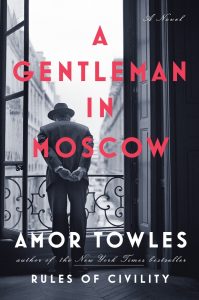Amor Towles: A Gentleman in Moscow (August 2025)
 In 1922 Moscow, Count Alexander Rostov a wealthy aristocrat aged 32 is charged with being a “Social Parasite” and placed under permanent house arrest at the Hotel Metropol where he has been living in a luxurious suite. He is given a small attic room with a few of his belongings and told he will be shot if he ever attempts to leave.
In 1922 Moscow, Count Alexander Rostov a wealthy aristocrat aged 32 is charged with being a “Social Parasite” and placed under permanent house arrest at the Hotel Metropol where he has been living in a luxurious suite. He is given a small attic room with a few of his belongings and told he will be shot if he ever attempts to leave.
Some found the beginning slow and wondered when the story was going to start but realised that his readjustment to this new life and some amusing vignettes were the story.
He annexes the adjoining room and has a cache of gold coins so maintains some comforts and money for his wine and bar bill. A bon vivant, the Count enjoys a social drink and good company.
He has an easy charm and courteous manner and, although an aristocrat, is no snob, forming deep friendships with the hotel staff.
Unfortunately, he can also make enemies. This was reflected in our group as some found him annoyingly clever and accomplished and too perfect.
He offends a waiter by offering a young couple his own advice on their choice of wine which causes problems years later when the waiter is promoted to hotel manager.
He almost ends a romance with Anna, a beautiful actress before it has begun by humiliating her by taking control of her large and boisterous hunting dogs. She gives him a second chance and they have a long love affair.
Another significant person is Nina, a little girl who befriends the Count and shares the Hotel pass key with him so they can explore together. Years later he adopts her daughter Sofia when Nina leaves to set up a home near the Gulag where her husband is imprisoned but never returns.
The Count is employed as a waiter and, as he is a well-travelled man, coaches a prominent party member, Osip, in the ways of the West.
They form an unlikely friendship and Osip becomes an invaluable ally in the Count’s later intrigues.
The Count and his colleagues manage to have some fun despite living under a repressive and joyless regime but there are times of sadness too. Early on he considers suicide but is brought out of his despair by the almost magical reappearance of the bees to the rooftop hive with pollen smelling of apple orchards from his childhood home.
When his companion from his student days, Mishka, dies he experiences the deep sorrow that comes when the last person who knew you from your youth is gone.
There is warmth and humour in the book and it is written with style. Some of us found it old-fashioned and a little “flowery” but the author deliberately writes in keeping with the pace of the work and the time and place in which it is set. Although it is not in the first person, it does have the feel of the voice of the Count.
There was a comment on the lack of political background in the book, especially given the turbulence of the time, but there were some footnotes and it isn’t really a historical novel as such. The book is more about resilience in the face of confinement and how the Count survived and adapted. This could be an inspiration for anyone who has to cope with unexpected turmoil when life changes whilst remaining true to oneself and able to maintain loving relationships.
The Metropol Hotel was a perfect mirror to the identity and charm of the main character and they both survive by adjusting to the new whilst holding on to the old.
“They spoke of the once and the was, of the wishful and the wonderful.”
3.5/5
